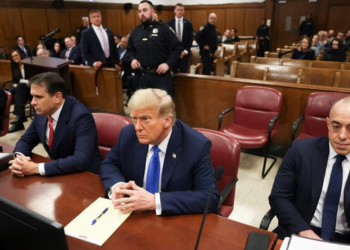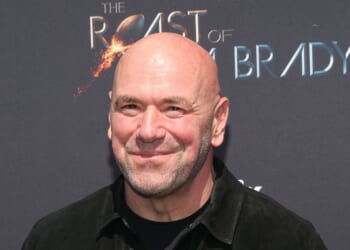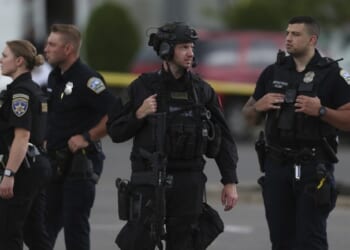
JOHANNESBURG, South Africa — One party has had a stranglehold on power for three decades, but there is much that is new in the contest this year as South Africans head to the polls on May 29.
The African National Congress (ANC), led to victory by the late Nelson Mandela at the post-apartheid nation’s first democratic vote in 1994, is polling below 50% and divided against itself as election day nears in Africa’s biggest economy and its fourth most populous country.
The result will likely have reverberations far beyond the region. The U.S. has cultivated South Africa as an economic and strategic partner, but in recent years Pretoria has been vocal — along with Russia and China — in the “BRICS” bloc of nations, challenging the U.S. and what they say is an international order set by the West that holds down those who try to contest Washington’s dominance in the world.
U.S.-South African relations have also been strained by Pretoria‘s lead role in pressing a case against Israel at the International Court of Justice over its Gaza campaign and the government’s refusal to break ties with Russia or condemn Moscow’s invasion of Ukraine.
Past reports of the ANC’s demise have proved exaggerated, but President Cyril Ramaphosa, a one-time business executive and union leader who took the helm in 2018, heads a ruling party that limps into the final weeks of the campaign split by factions, some ethnic but mostly political.
Former President Jacob Zuma, 82, whose tenure was cut short in 2018 over allegations of corruption, has broken off to form his own party, uMkhonto we Sizwe (MK), named for the ANC’s military wing when it fought against white rule. In those days, Mr. Zuma, exiled in nearby Zambia, was head of intelligence for the original MK which had close ties to the Soviet Union.
The ANC’s former youth leader, Julius Malema, now 43, is also trying to dislodge his former party with his leftist Economic Freedom Fighters (EFF), with a platform calling for the nationalization of banks, mines and farmland without compensation.
And another ex-ANC president, Thabo Mbeki, who in 1999 took over from Mandela as head of state, has been brought out of retirement to challenge Jacob Zuma over the multiple charges of financial abuse he faces in the courts. These accusations would surely have been voiced by the incumbent, Mr. Ramaphosa, had it not emerged that in 2022, U.S. currency amounting to $580,000 was found stashed in a sofa at Mr. Ramaphosa’s own farm 100 miles north of the capital, Pretoria.
The ANC used its numbers in Parliament to block discussion on the issue and defeated a motion for their leader’s impeachment. But “Sofagate” as it became known, has given Mr. Zuma the perfect retort should Mr. Ramaphosa try to portray him as a crook. Both deny any wrongdoing during their time in office.
Bumpy ride
As in the U.S., the South African constitution allows a president just two terms, though the span is five years instead of four. Voters on May 29 will elect a new lower house of the National Assembly, and depending on the share of votes each party gains, members of the upper house are then nominated. On the same day, voters will choose a provincial legislature in each of the nine provinces.
The ANC has enjoyed a majority in both houses of the Assembly since the end of apartheid, and has never needed a coalition partner to form a government.
There have been bumps along the way: in 2008, Mr. Mbeki’s second stint was cut short when the ANC removed him from office at the instigation of Mr. Zuma, who then suffered the same fate at the hands of Mr. Ramaphosa.
The ANC reached its zenith in 2004 under Mr. Mbeki, when it took almost 70% of the 400 seats in the national parliament, more than the two-thirds required to change the constitution. But there has been a steady erosion since, with rising unemployment and seemingly endless scandals about corruption and a string of troubles at state-owned entities.
In 2020, the once-profitable South African Airways went into liquidation. During the Zuma presidency, the state airline — that in its heyday flew the world’s longest non-stop route between Johannesburg and Washington Dulles airport — ran up losses of more than a half-billion dollars.
Until recently, power cuts have been a daily problem as Eskom – a state monopoly that provides most of the country’s electricity – has struggled to meet demand. In campaign mode, Mr. Ramaphosa announced in February that “the worst is behind us,” citing repairs and other reforms that abruptly ended two years of disruptive and debilitating power outages.
The authorities insist this is not an election stunt, but a cynical public has responded by joking that May 30 — the day after the election — will be “South Africa‘s D-Day,” in which the “D” stands for darkness as the lights go out after the election is safely over.
Perilous polls
Opinion polls are costly and challenging in a country with 11 official languages and rural voters spread across an area of almost a half-million square miles. But no survey this year has put the ANC above 45%, while some peg it below 40%: the first time the party has found itself with less than half the electorate in its camp.
Five years ago, Mr. Ramaphosa took office with 57.5% of the national vote. Now Mr. Zuma’s MK party is polling up to 13%, which analysts agree has come mostly from the political base of the ANC.
Mr. Ramaphosa has an easy manner and more than any of his predecessors, has made himself accessible to voters at meetings around the country. He is close to the political center of his party, but has not been able to reverse the fall in support.
And the ANC got more bad news just as the campaign was entering the home stretch: Stats-SA, the national statistics agency, reported Tuesday that the national jobless rate in the first quarter of 2024 rose nearly a percentage point to an eye-popping 32.9%, while nearly half the nation’s youth (45.5%) are unemployed.
It did not take long for the liberal Democratic Alliance (DA), the country’s main opposition party, to highlight the weak employment numbers and the political problem they pose for Mr. Ramaphosa’s government. DA Shadow Labor Minister Michael Bagraim told reporters that “the jobs bloodbath” is “a more compelling reason to vote the ANC out in two weeks’ time.”
The Zulu vote
Among South Africa‘s 62 million people, there is no ethnic majority, but speakers of the Zulu language make up a quarter of the population, and Mr. Zuma now stands as by far the most senior figure among the Zulu.
He portrays the government as heavy with lawyers and economists, an elite out of touch with the masses. It’s a message that resonates way beyond ethnicity with the legions of youth who live four or five to a shack and struggle to make a living. When Mr. Zuma rallies his new MK party on Saturday at Johannesburg‘s Orlando sports stadium, they will be there.
The Democratic Alliance, led by John Steenhuisen, 48, attracts around a quarter of the vote in recent polls. With a white population in South Africa of just 8%, his appeal extends across racial boundaries. The DA is leading in Pretoria and the industrial hub of Johannesburg, and has long held power in Cape Town.
Surprisingly, it is a 34-year-old openly gay white man from the DA, Chris Pappas, who looks set to become provincial premier in KwaZulu-Natal. He stands out as the greatest challenge to both ANC and the MK because, unlike most white South Africans, Mr. Pappas speaks flawless Zulu and has drawn massive crowds to his rallies.
An opposition agenda
Mr. Steenhuisen has warned that if the ANC loses its majority, it will likely form what he calls a “Doomsday coalition” with Mr. Malema‘s EFF, which looks look set to win 12% of the vote. The price, he says, would be the EFF’s demand for wholesale nationalization of the economy. And, on foreign policy, a further drift away from the U.S. and the West.
Mr. Steenhuisen told The Washington Times that if his party wins enough votes to lead a rival coalition into office, he would adopt a very different approach to world affairs.
“South Africa has never been a client state to any of the great powers, though we served with the Allies in both World Wars and in Korea,” he said. “But there is almost a knee-jerk reaction in the current government against anything proposed or supported by the United States, even though it is one of our biggest partners in trade.”
He said conflicts in central Africa and instability in Somalia and the Sahel region “have led to vast numbers of refugees coming south and — while it is important that we help these people — what we really need is to find solutions that bring peace to their home countries.”
The DA’s shadow foreign minister, Emma Powell, said that instead of debating wars in Ukraine and Gaza, South Africa should “focus on the bloodbath unfolding on the African continent”. She said wars in the Democratic Republic of Congo and the fight against extremist groups in West Africa had been ignored.
“If the ANC was genuinely interested in peace, human rights or the rule of law, they would have spoken out against the tragedy unfolding in Sudan, where more than 10,000 civilians have been killed in some of the most brutal ethnic cleansing the world has witnessed in a generation.”
In October, South Africa abstained from a resolution at the United Nations Human Rights Council calling for a cease-fire in Sudan.
On talk radio and in the press, South Africans voice the same concerns as voters in other democracies, and Mr. Steenhuisen’s campaign has focused on this.
“People want a safe place to call home, a job that has meaning, education that provides our children with opportunity, and the freedom to say what we think. And be it in Cape Town or Kansas, these are the basic rights every government has to deliver. And my party intends to do exactly that.”











